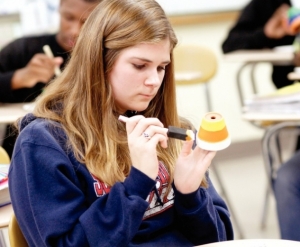Southern Wayne High School program allows students to explore
By Phyllis Moore
Published in News on October 31, 2012 1:46 PM

News-Argus/BOBBY WILLIAMS
Southern Wayne student Kasey Sparks puts the finishing touches on a flower pot during a Saint Success period at the high school. Southern Wayne has instituted a 25-minute special period four days a week that gives students either a chance to catch up on coursework or explore new studies.
DUDLEY -- Sometimes the first step to getting good grades in high school is to take some of the pressure off and offer classes students enjoy.
"We realized that the more kids get involved in school, the more successful they'll be and the more fun they'll have," said Principal Dr. John Boldt. "School is about more than academics. It's about learning, about the passion for learning."
Boldt credits Andy Mitchell, a social studies teacher, and Assistant Principal Karen Rogers with introducing "Saint Success" to the school's daily routine this year.
Four days out of the week, for 25 minutes, students can choose from an array of course offerings.
But it's not all about fun and games.
"We started by giving students a choice, a pick of their top three choices," Boldt explained, adding, "unless they need remediation."
It is, after all, school.
The ultimate purpose, Boldt said, is to help struggling students by giving them a block of time during the day to get help with courses, do make-up work or complete graduation projects.
Other students can choose to use the time for tutoring other students, preparing for club competitions or just learning about something they have a special interest in.
"And we have got plans with that to make sure that the study hall teacher is connected with the regular teachers -- so that they can help the kids stay caught up, do retests if they need to, make up work if they need to do it," Mrs. Rogers said. "We're hoping that the kids are going to work hard enough to get out of these study halls so they can get into the fun stuff, the enrichment."
Mitchell is an alumnus of Southern Wayne. He says he can recall when all high schools offered vocational classes that weren't tied to a test, giving students a chance to learn special skills.
"We have gotten into the idea that everything's got to be tested," he said. "There's not many classes that the kids get the weight pulled off them. I think this is going to motivate them to do other things."
Students can pick from 40 to 50 options during each four-and-one-half-week session -- with choices ranging from crocheting and scrapbooking to turf management and firefighting.
"One of the groups is doing mini service projects, cleaning windows, picking up trash, an art group is doing murals around the school. We're doing a lot of beautification projects," Mrs. Rogers said. "We actually asked teachers to give us ideas. 'During the school day, if you could do anything to help kids, what would it be?' The craft time, the firefighting, the crocheting, those are all things they wanted to do, to give kids hobbies."
Student suggestions were also taken into consideration, and the educators said they were pleasantly surprised at the response -- not only for classes like creative writing and crafts, but to give back as peer tutors.
The ideat is in line with educational trends, the assistant principal said.
"I think it supports the 21st century attributes that we're responsible for," she said. "In addition, all of those classes, they're learning how to collaborate, learning skills and problem-solving skills, all those things.
"I think it supports what the other 90-minute classes are doing. We need to offer these kids that are hands-on, minds-on, we want their minds engaged."
Mitchell's response to skeptics of the non-credit classes?
"One of the things that people don't realize is schools teach students a lot about being productive citizens after they leave school," he said, while attempting to "spark them to have an interest" in other subjects.
"One big part of our job is showing kids how to act in different situations and what's really important."
"There's no credit, but it's just learning for learning sake," added Boldt. "I think students, a lot of them want to know, 'Is this going to be graded? What am I going to get out of it?'
"The purpose is just to have fun, learning a new skill or a new activity."
